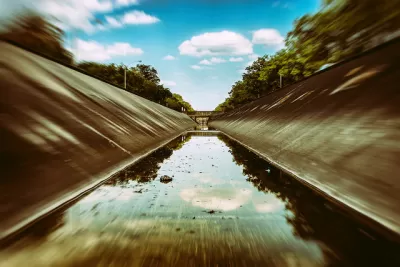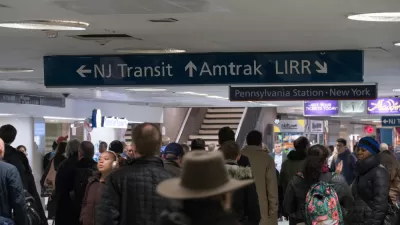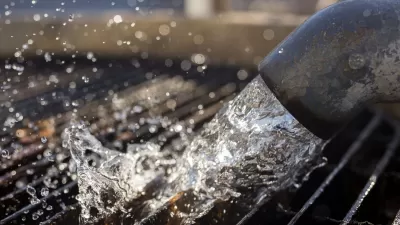The WIFIA federal loans program provides start-up capital to local water infrastructure projects. The program is designed to encourage experimentation and cost-effective construction strategies.

The Trump administration's infrastructure plan remains unclear, especially as press conferences on the subject devolve into controversial (to put it mildly) off-the-cuff remarks on national tragedies. Nevertheless, the Brookings Institution is still looking at how Washington could move forward on infrastructure, and it has identified the EPA's Water Infrastructure Finance and Innovation Act (WIFIA) program as a good bet.
Citing its bipartisan support, Joseph Kane writes, "WIFIA offers greater financial flexibility to a wide variety of utilities, municipalities, and other eligible entities who may lack the capacity to fund water infrastructure upgrades, by helping cover up to 49 percent of project costs and targeting large-scale improvements."
"Unlike federal grants, WIFIA loans depend more on the ability of borrowers to generate revenue, reduce investment risk, and consider other forms of private and nonfederal financing; as a result, it is estimated that the initial federal subsidy can drive more than $2 billion in water loans."
Kane concludes by qualifying all of this. "Time will tell how effective these loans can be in getting projects done nationally, but they mark a step in the right direction at a moment with little to no infrastructure leadership in Washington."
FULL STORY: Despite federal infrastructure cuts, EPA’s WIFIA water loan program holds promise

Alabama: Trump Terminates Settlements for Black Communities Harmed By Raw Sewage
Trump deemed the landmark civil rights agreement “illegal DEI and environmental justice policy.”

Planetizen Federal Action Tracker
A weekly monitor of how Trump’s orders and actions are impacting planners and planning in America.

Why Should We Subsidize Public Transportation?
Many public transit agencies face financial stress due to rising costs, declining fare revenue, and declining subsidies. Transit advocates must provide a strong business case for increasing public transit funding.

Understanding Road Diets
An explainer from Momentum highlights the advantages of reducing vehicle lanes in favor of more bike, transit, and pedestrian infrastructure.

New California Law Regulates Warehouse Pollution
A new law tightens building and emissions regulations for large distribution warehouses to mitigate air pollution and traffic in surrounding communities.

Phoenix Announces Opening Date for Light Rail Extension
The South Central extension will connect South Phoenix to downtown and other major hubs starting on June 7.
Urban Design for Planners 1: Software Tools
This six-course series explores essential urban design concepts using open source software and equips planners with the tools they need to participate fully in the urban design process.
Planning for Universal Design
Learn the tools for implementing Universal Design in planning regulations.
Caltrans
Smith Gee Studio
Institute for Housing and Urban Development Studies (IHS)
City of Grandview
Harvard GSD Executive Education
Toledo-Lucas County Plan Commissions
Salt Lake City
NYU Wagner Graduate School of Public Service




























